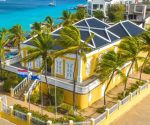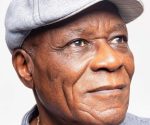“A strong country in an unstable world”
King Willem-Alexander’s third Troonrede

King Willem-Alexander, with Queen Maxima by his side, pronounces the Troonrede. Photo contributed
THE HAGUE – The Caribbean part of the kingdom remains the poor cousin in the annual speech of King Willem-Alexander at the opening of the parliamentary year in the Netherlands. Last year, the so-called Troonrede contained one line: “Together with the Caribbean part of the Kingdom the Netherlands keeps working on a good future.” This year, the reference to the islands was summed up as follows: “In close cooperation with the Caribbean parts of the kingdom the government conducted a successful campaign for the temporary membership of the Security Council of the United Nations.”
“The Netherlands is a strong country in an unstable world,” is how the king described the current position of the Netherlands.
Healthy state finances and a strong economy are the foundation for a good and solidary social system, good healthcare and education and a high quality of other public facilities, King Willem-Alexander pointed out in his third Troonrede since he succeeded Queen Beatrix in 2013.
The Troonrede refers to the situation of a couple of years ago when unemployment peaked near 8 percent with 700,000 people out of a job, a budget deficit of almost 4 percent, plummeting real estate prices, rapidly rising healthcare costs and a pension system that threatened to become prohibitively expensive.
But times have changed: the government predicts economic growth of 1.7 percent in 2017, the real estate market has recovered and the costs of healthcare have been brought more or less under control. The budget deficit for 2017 is projected to be 0.5 percent, while the national debt is decreasing rapidly towards 60 percent. Unemployment stands now at 5.8 percent.
The Netherlands will abolish the youth minimum wage (for workers younger than 21) and compensate employers to prevent a negative effect on employment.
There are interesting paragraphs in the Troonrede about law enforcement. There is more money for the armed forces, the police, the administration of justice and the Public Prosecutor’s Office. Crime figures are steadily declining, the king said, adding that the government keeps investing in improved security. This year €250 million became structurally available for this purpose and in 2017 another €450 million is added. “This gives the people who make efforts every day for our safety more space to execute their jobs: from the community police officer to special units for counter-terrorism, and from the public prosecutor to the prison guard.”

Below is the unabridged translation of the Troonrede King Willem-Alexander pronounced yesterday in The Hague.
Sustainable progress
“Since a couple of years the Netherlands is on firm ground again. The financial-economic crisis is behind us. We live in a prosperous and attractive country, also compared to other countries, and we have good facilities, a good infrastructure and a strong constitutional state. We have a lot to be proud of and to build on.
At the same time unrest and unease characterize these times in the daily maelstrom. With everything that is going on worldwide, it is understandable that our community is concerned and tends towards stronger bonds with what is familiar and known. The international threat of terrorism, the instability at the outer frontiers of Europe, the refugee issue and the economic uncertainties in the global market are after all real problems with a large impact on our daily lives.
It is however not for the first time in our country’s history that we have to look for solutions to threatening and unpredictable developments. It is also not for the last time that we will find those solutions together. The recently deceased former Prime Minister Piet de Jong, who almost turned the sensible handling of unrest and change into an art form, spoke in his time regularly about the need for sustainable progress. He once said: “It is a task of the government to look out for what the future must become and bring about as timely as possible adjustments that are necessary to grab the opportunities that future offers.”
This cabinet-period began with the conviction that healthy state finances and a strong economy are the foundation for a good and solidary social system, good healthcare and education and a high quality of other public facilities for the next generations. During all the large changes that have occurred, the objective of the government’s policy has remained unchanged: taking care of a future wherein progress, innovation and economic growth can go together with protection, solidarity and taking care of each other – in the best traditions of our country.
Several years ago these achievements were under pressure. The economy shrank, the budget deficit was almost 4 percent and the number of people looking for work peaked at 700,000, about 8 percent of our work force. Next to that the prices for houses had decreased sharply, the AOW (old age pension – ed.) threatened to become prohibitively expensive and the healthcare costs increased year after year much faster than the national income.
That our country is now in a significantly better position than a couple of years ago and is part of the leading group in Europe is a collective performance. Political differences were bridged and several social interests have been brought together. Never before did so many large reforms begin simultaneously, often with the support from opposition parties and social organizations. This happened in healthcare and education, in the labor market and the housing market, the AOW, the energy sector and the financial sector. In the process much has been asked from everyone. Many made financial sacrifices and there was a strong call on the preparedness to accept changes in our daily life. Without the perseverance, the hard work and the entrepreneurial spirit of the Dutch population the result would have been less positive.
Since a couple of years the Dutch economy is stable again. The expected growth for 2017 will be 1.7 percent, in spite of the Brexit. The housing market has improved and the cost increases in healthcare have been limited. The budget deficit decreases next year to 0.5 percent and the national debt decreases rapidly towards 60 percent of our national income.
This way there is again space to move. The mortgage of fewer people is under water, which makes moving easier. Tenants get more financial space through the increase of the rent allowance. Entrepreneurs with confidence in the future invest sooner in employees and in the upgrading of their companies. And families will have more money to spend.
An increasing number of people are finding work again. After 2014 our country added more than 225,000 jobs. Step by step the unemployment rate had been brought down to 5.8 percent. It is positive that more job seekers about the age of 45 are finding work. The number of employed youngsters is at the highest level in seven years. The agreements with employers about more jobs for people with a handicap are executed energetically. The labor participation also grows because an increasing number of citizens wants and is able to participate in the labor market. This does mean that the number of unemployed people goes down slower than hoped. This is why tackling unemployment, especially the long-term unemployment, still has a high priority.
With the social partners the government has agreed about a number of targeted measures. The rules for seasonal work will be relaxed and unemployed people above the age of 50 will get more intense support to find work. The minimum youth wage from the age of 21 years will be abolished in two steps, because youngsters also deserve a just salary. Employers will get compensation to prevent negative effects on employment.
The risks and uncertainties for our open and internationally oriented economy are mainly coming from abroad. Lower growth figures in emerging markets like china and Brazil affect us. Because of the announced Brexit there are also new uncertainties in Europa that affect the Netherlands. The United Kingdom is an important trading partner and the Brexit will cost jobs, also in our country. The objective of the government is that the economic relationships remain strong.
For the open Dutch economy cooperation in Europe is crucial. The Netherlands keeps focusing in the European Union on growth and jobs. A stable euro, a strong and decisive banking union and a strong and fair internal European market, with equal pay for the same work in the same location, are of direct interest for our country.
Due to the positive financial-economic developments there is slowly but surely again space for the growth of incomes and for targeted investments in the future. It is gratifying that the purchasing power will grow this year and next year for workers, the elderly and people on social benefits. This way the government offers again a balanced distribution of purchasing power. The care allowance will go up. An impulse of €200 million lowers the threshold for young parents to make use of daycare – making is easier to combine work and family. It is important the children who threaten to grow up in poverty are able to take part in school trips, become a member of a sport club and get the opportunity to attend music lessons. For this purpose €100 million will become available. Intended cost cutting measures in the long-term car for the elderly and the handicapped of half a billion euro are dropped. In education extra funds become available to promote equal opportunities. The allowance for specific expenditures in the MBO (secondary vocational education), for instance for work clothing, tools and software, goes up.
Large investments in energy transition, sustainability, accessibility and education are desired. Small and medium enterprises must be able to get financing for new growth. The government will come with proposals to support these investments better where necessary.
Investing in the future also means tackling problems like those that occur in the earthquake area in the province of Groningen. The consequences are far-reaching and the government wants to work on solutions with everyone who has been affected. By cutting gas extraction in half compared to 2012 and by reinforcing houses and other structures, safety risks will be limited.
The consequences of climate change require significant investments and innovations in sustainable energy sources, like wind, water and sunlight. Agreements about affordable and clean energy supply have been anchored in the energy accord. This development is not only good for the environment; it also creates jobs and opportunities for the Dutch private sector.
Because of the security situation, nearby and elsewhere in the world, the government makes again additional money available for the armed forces, the police, the administration of justice and the Public Prosecutor’s Office. Since 2014 the defense budget had been increased in steps, towards an additional structural 870 million in 2020.
The crime figures in the Netherlands are steadily going down and the government keeps investing in the improvement of security. The budget of 2016 made already an additional structural amount of €250 million available. From 2017 an additional €450 million is added to this amount. This gives the people who make efforts every day for our safety more space to execute their jobs: from the community police officer to special units for counter-terrorism, and from the public prosecutor to the prison guard.
In the year that is behind us the world was again shocked by terrible jihadist attacks that cause immeasurable sorrow and human suffering. France, Belgium, Germany and Turkey were among the affected countries.
We may and will not allow in any way that terrorists threaten our freedom, our security and our democratic values. The Action Program Integral Approach Jihadism contains a mix of preventive and repressive measures. The cabinet wants to eradicate the breeding ground for radicalization in the Netherlands, for instance by promoting active citizenship in schools. Traveling abroad for jihadis will become more difficult and their social benefits will be stopped. They will be criminally prosecuted and risk losing their citizenship after a guilty verdict.
Working together in Europe in combating terrorism is crucial. Within the European Union our country is working intensively on a better exchange of information between European intelligence and investigation services, joint border control, tackling the flow of capital and improving cyber security.
Outside of Europe the Netherlands keeps contributing to the fight against ISIS in the hot spots in Syria and Iraq with military, humanitarian and political resources. Our soldiers and aid workers there and elsewhere in the world are doing important work under difficult circumstances, supporting international stability and oppressed people.
In close cooperation with the Caribbean parts of the Kingdom the government has conducted a successful campaign for the temporary membership of the Security Council of the United Nations. Reform of the United Nations is an important theme for the Dutch government. The priority is an integrated approach of peace, safety and development during the prevention of conflicts and the protection of citizens.
War and terror drive innocent people away from their homes towards an uncertain future. During the Dutch presidency of the European Union in the first half of 2016 much has been put in motion to bring the flow of refugees from Syria and other vulnerable countries under control. That policy is underpinned by three pillars: eliminating the reason to flee by improving living conditions and combating violence on site, and combating human smuggling via perilous see routes. The Netherlands helps with €260 million for improvement of shelter in the region.
In March 2016 agreements have been made with the Turkish government about containing and better regulating the flow of refugees. The number of people that are drowning in a horrible way during improvised trips between Turkey and Greece and the number of asylum seekers that is coming to Europe, has substantially diminished because of this. The further execution of these agreements requires the necessary attention in the coming period.
The Netherlands is a country that offers everyone who qualifies the opportunity to integrate in the society and to make everyone who lives here feel at home. Asylum seekers who come to the Netherlands receive a decent but sober shelter. Last year this has been successful due to the efforts of municipalities, relief organizations and many volunteers. Those who want to build a future in the Netherlands must be prepared to learn the language and to make an active contribution. We expect that everyone bonds consciously and positively with our country and the way we live. The mandatory participation declaration kicks in in 2017. Participation and integration are promoted by allowing asylum seekers to work as volunteers.
It fits with the character of the Netherlands that in many neighborhoods and municipalities all kinds of private initiatives are undertaken to involve asylum seekers in the community. At the same time it is logical that there is unrest in the community about the arrival of large groups of refugees. We wonder whether the differences in culture and standards and values are not too big and whether facilities are not coming under too much pressure.
In the Netherlands we have fought long for a number of democratic values, among them the separation of church and state, the freedom of expression and the freedom of religion. In our country men and women are equal for the law and we do not discriminate based on race, religion or sexual orientation. Everyone who wants to live in our country has to respect and abide by these values. We do not ask anyone to renounce their origin or culture, but there is no going back on constitutionally established standards and we will act tough against intimidation and violence.
The Netherlands is a strong country in an unstable world. During the last couple of years we have reached results together that make that we can look with confidence towards the future. It is not sensible to underestimate the problems and international uncertainties the Netherlands is confronted with. But history teaches us that sustainable progress is possible by working together on solutions, in our own country and with our international partners.
This also characterizes your work in the parliamentary year that begins today. You may feel supported by the idea that many wish you wisdom and pray with me for strength and God’s blessing for you.”






















